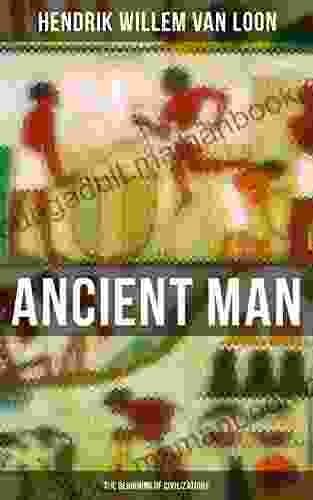The Origin and Evolution of Civilizations: A Comprehensive Journey Through Human History

The development of civilizations is one of the most fascinating and complex phenomena in human history. From humble beginnings in small, nomadic communities to the sprawling urban centers of today, civilizations have shaped the course of our world in countless ways.
The Origins of Civilization
The origins of civilization are shrouded in mystery, but archaeologists and historians have pieced together a general timeline of human development that led to the emergence of the first civilizations.
4 out of 5
| Language | : | English |
| File size | : | 2745 KB |
| Text-to-Speech | : | Enabled |
| Screen Reader | : | Supported |
| Enhanced typesetting | : | Enabled |
| Print length | : | 79 pages |
- Hunter-gatherer societies: For thousands of years, humans lived as hunter-gatherers, relying on hunting and gathering for their food and shelter. They lived in small, nomadic groups and had a very simple social structure.
- Agricultural revolution: Around 10,000 years ago, humans began to develop agriculture. This led to a dramatic increase in food production, which in turn led to a population explosion and the development of permanent settlements.
- Urbanization: As populations grew, people began to live in larger communities. These communities eventually developed into cities, which became the centers of trade, government, and culture.
- Civilization: A civilization is a complex society that has a high level of social and political organization, as well as a developed written language and a system of government. The first civilizations emerged in Mesopotamia, Egypt, and India around 4,000 years ago.
Factors Influencing the Development of Civilization
Many factors contributed to the development of civilizations, including:
- Geography: The location of a civilization often played a major role in its development. Civilizations that were located near rivers or other bodies of water had access to transportation and trade routes, which helped them to grow and prosper.
- Climate: The climate of a region also had a significant impact on the development of civilization. Civilizations that were located in warm, fertile regions were able to produce more food and support a larger population.
- Natural resources: The availability of natural resources, such as minerals, wood, and water, was another key factor in the development of civilization. Civilizations that had access to abundant natural resources were able to develop more advanced technologies and societies.
- Technology: The development of technology played a major role in the growth and development of civilizations. New technologies, such as the plow, the wheel, and the written language, made it possible for civilizations to increase their productivity, expand their territory, and develop more complex social and political structures.
- Social organization: The social organization of a civilization was also a key factor in its development. Civilizations that were able to develop a stable social hierarchy and a system of government were able to maintain order and provide for the needs of their citizens.
The Earliest Civilizations
The earliest civilizations emerged in Mesopotamia, Egypt, and India around 4,000 years ago. These civilizations were all located in river valleys, which provided them with access to water, transportation, and trade routes.
- Mesopotamia: The first civilization in Mesopotamia was the Sumerian civilization, which emerged in the Tigris-Euphrates river valley around 4,500 years ago. The Sumerians developed a written language, a system of government, and a complex social hierarchy. They were also skilled builders and engineers, and they constructed some of the world's first cities, including Ur and Uruk.
- Egypt: The ancient Egyptian civilization emerged in the Nile River valley around 4,000 years ago. The Egyptians developed a written language, a system of government, and a complex social hierarchy. They were also skilled builders and engineers, and they constructed some of the world's most famous monuments, including the pyramids of Giza.
- India: The Indus Valley civilization emerged in the Indus River valley around 4,000 years ago. The Indus Valley civilization was one of the most advanced civilizations of its time. It had a written language, a system of government, and a complex social hierarchy. The Indus Valley people were also skilled builders and engineers, and they constructed some of the world's first cities, including Mohenjo-daro and Harappa.
The Spread of Civilization
Once civilizations emerged in Mesopotamia, Egypt, and India, they began to spread to other parts of the world. Trade and cultural exchange played a major role in the spread of civilization. Civilizations also spread through conquest and colonization.
- Trade: Trade routes connected civilizations all over the world. Goods, ideas, and technologies were exchanged between different cultures, which led to the spread of civilization.
- Cultural exchange: Cultural exchange also played a role in the spread of civilization. People from different cultures interacted with each other through trade, diplomacy, and travel. This led to the exchange of ideas, beliefs, and customs, which helped to spread civilization.
- Conquest: Conquest was another way in which civilization spread. Powerful civilizations often conquered weaker civilizations and imposed their own culture and way of life on the conquered people.
- Colonization: Colonization was another way in which civilization spread. Civilizations often established colonies in new territories. These colonies were often used to exploit the resources of the new territory and to spread the colonizing civilization's culture and way of life.
The Legacy of Civilization
Civilizations have left a lasting legacy on the world. The technologies, ideas, and institutions that were developed by civilizations have shaped the course of human history. Civilizations have also created some of the world's greatest works of art, architecture, and literature.
- Technology: Civilizations have developed a wide range of technologies that have had a profound impact on human life. These technologies include the wheel, the plow, the printing press, and the computer.
- Ideas: Civilizations have also developed a wide range of ideas that have shaped the way we think about the world. These ideas include the concept of democracy, the rule of law, and human rights.
- Institutions: Civilizations have also developed a wide range of institutions that have helped to organize human society. These institutions include the family, the government, and the school.
- Art: Civilizations have created some of the world's greatest works of art. These works of art include the paintings of the Renaissance, the sculptures of ancient Greece, and the music of the Baroque period.
- Architecture: Civilizations have also created some of the world's greatest works of architecture. These works of architecture include the pyramids of Egypt, the temples of ancient Greece, and the cathedrals of medieval Europe.
- Literature: Civilizations have also created some of the world's greatest works of literature. These works of literature include the epics of Homer, the plays of Shakespeare, and the novels of Tolstoy.
The development of civilizations is one of the most important and transformative events in human history. Civilizations have shaped the course of our world in countless ways, and their legacy continues to inspire and inform us today.
4 out of 5
| Language | : | English |
| File size | : | 2745 KB |
| Text-to-Speech | : | Enabled |
| Screen Reader | : | Supported |
| Enhanced typesetting | : | Enabled |
| Print length | : | 79 pages |
Do you want to contribute by writing guest posts on this blog?
Please contact us and send us a resume of previous articles that you have written.
 Top Book
Top Book Novel
Novel Fiction
Fiction Nonfiction
Nonfiction Literature
Literature Paperback
Paperback Hardcover
Hardcover E-book
E-book Audiobook
Audiobook Bestseller
Bestseller Classic
Classic Mystery
Mystery Thriller
Thriller Romance
Romance Fantasy
Fantasy Science Fiction
Science Fiction Biography
Biography Memoir
Memoir Autobiography
Autobiography Poetry
Poetry Drama
Drama Historical Fiction
Historical Fiction Self-help
Self-help Young Adult
Young Adult Childrens Books
Childrens Books Graphic Novel
Graphic Novel Anthology
Anthology Series
Series Encyclopedia
Encyclopedia Reference
Reference Guidebook
Guidebook Textbook
Textbook Workbook
Workbook Journal
Journal Diary
Diary Manuscript
Manuscript Folio
Folio Pulp Fiction
Pulp Fiction Short Stories
Short Stories Fairy Tales
Fairy Tales Fables
Fables Mythology
Mythology Philosophy
Philosophy Religion
Religion Spirituality
Spirituality Essays
Essays Critique
Critique Commentary
Commentary Glossary
Glossary Bibliography
Bibliography Index
Index Table of Contents
Table of Contents Preface
Preface Introduction
Introduction Foreword
Foreword Afterword
Afterword Appendices
Appendices Annotations
Annotations Footnotes
Footnotes Epilogue
Epilogue Prologue
Prologue Amanda Hanna
Amanda Hanna Roger Mcgough
Roger Mcgough Ennki Hakari
Ennki Hakari Susan Orlean
Susan Orlean Tristan Sandler
Tristan Sandler Sy Montgomery
Sy Montgomery Joel Goldman
Joel Goldman Chogyam Trungpa
Chogyam Trungpa Chihsien Liang
Chihsien Liang Scott Thompson
Scott Thompson Chaitanya Limbachiya
Chaitanya Limbachiya John C Waugh
John C Waugh Casey Watkins
Casey Watkins Marc Plinke
Marc Plinke Seana Kelly
Seana Kelly Jeffrey Wickes
Jeffrey Wickes Diana Rosado
Diana Rosado Jillian Lin
Jillian Lin Susan Hayes
Susan Hayes Sergi Belbel
Sergi Belbel
Light bulbAdvertise smarter! Our strategic ad space ensures maximum exposure. Reserve your spot today!

 Alan TurnerSimple Ways To Create More Joy, Love, And Prosperity Into Your Life: Becoming...
Alan TurnerSimple Ways To Create More Joy, Love, And Prosperity Into Your Life: Becoming... Pat MitchellFollow ·19.1k
Pat MitchellFollow ·19.1k Dominic SimmonsFollow ·19.5k
Dominic SimmonsFollow ·19.5k Dwight BlairFollow ·13.2k
Dwight BlairFollow ·13.2k Todd TurnerFollow ·14.9k
Todd TurnerFollow ·14.9k Juan RulfoFollow ·3.3k
Juan RulfoFollow ·3.3k Cruz SimmonsFollow ·8.1k
Cruz SimmonsFollow ·8.1k Jacob HayesFollow ·19.6k
Jacob HayesFollow ·19.6k Jerome BlairFollow ·15.3k
Jerome BlairFollow ·15.3k

 Yukio Mishima
Yukio MishimaUnveiling the Zimmermann Telegram: A Pivotal Document in...
The Zimmermann Telegram, a diplomatic...

 George Martin
George MartinFearful Stories and Vile Pictures to Instruct Good Little...
In the annals of children's literature, few...

 Grant Hayes
Grant HayesJessica the Viscount Wallflower: A Tale of Transformation...
In the opulent ballrooms and glittering...

 Jerome Blair
Jerome BlairThe Economics of the Global Defence Industry: A...
The global...

 Blake Kennedy
Blake KennedyBreath of Heron - A Window into the Poetic Depths of...
In the realm of...
4 out of 5
| Language | : | English |
| File size | : | 2745 KB |
| Text-to-Speech | : | Enabled |
| Screen Reader | : | Supported |
| Enhanced typesetting | : | Enabled |
| Print length | : | 79 pages |












